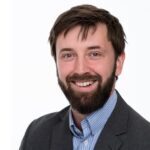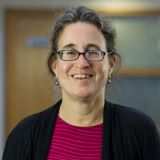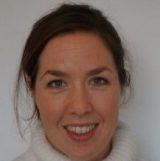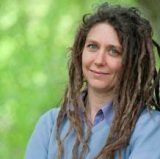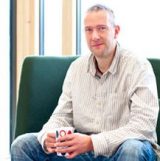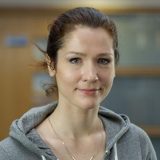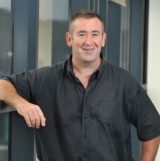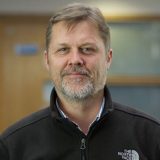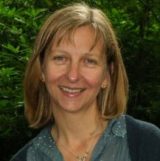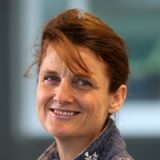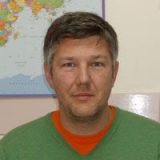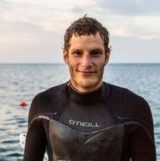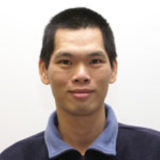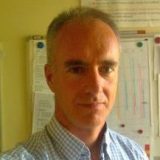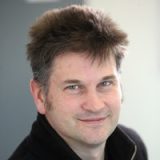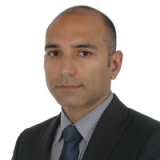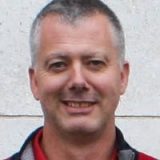Dr Peter Melville-Shreeve has worked in consultancy, startups and academic roles over the last decade. He works closely with the Chartered Institution of Water and Environmental Management’s (CIWEM’s) policy team to support sustainable water management systems and chair’s CIWEM’s Water Reuse Task & Finishing Group. Much of Peter’s early research focusses on rainwater management systems and the need for dual purpose designs – which can mitigate droughts and floods. His thesis highlighted the opportunities for Internet of Things technologies to be harnessed to reduce water demand AND manage stormwater flood risk. He consequently founded and exited a technology business which developed analytics and control systems to enable such technologies to be implemented at a range of scales.
Rich Crane
Rich’s key research and teaching areas are extractive metallurgy, materials science, nanotechnology and applied geochemistry for a range of applications including the development of novel mining techniques, mine site reclamation, waste treatment, water treatment and contaminant transport.
More information on Rich’s institutional profile
lora fleming
Lora is the director of the Centre for Environment and Human Health and chair of oceans and human health at the University of Exeter Medical School. She is a board certified occupational and environmental health physician and epidemiologist with over 30 years of experience and expertise in environment and occupational exposures and human health research and training.
Nina Wedell
Nina is an evolutionary biologist with research interests focused on the evolutionary ecology of sex. She has worked extensively on various aspects of sexual selection and sexual conflict, in particular on the role of selfish genetic elements in reproductive biology.
Gabriel Yvon-Durocher
Gabriel researches the effects of environmental change on the structure and functioning of ecosystems (which comprise groups of species, their interactions with one another and with the physical and chemical environment in which they exist). His work spans multiple levels of biological organisation, from sub-cellular biochemistry to the dynamics of ecosystems, and searches for similarities across aquatic and terrestrial systems. The ultimate goal of his work is to develop a predictive ‘tool box’ to forecast how ecosystems will change in a world increasingly dominated by humans and the oceans.
Michiel vos
Michiel combines approaches from microbiology, evolutionary ecology and population genomics to study bacterial evolution, focusing on horizontal gene transfer, sociomicrobiology and pathogens in the environment. Key projects include exploring the ecological drivers of antimicrobial resistance and virulence in aquatic bacteria.
Rod Wilson
Rod is a comparative physiologist. He aims to provide a more holistic understanding of homeostasis in aquatic animals, both fish and invertebrates, freshwater and marine. This includes studies of how anthropogenic and natural environmental changes impact upon physiology and behaviour in the wild, and how to use physiology to help improve the sustainability of aquaculture (including animal growth efficiency and health, pathogen/parasite resistance, and farm effluent output). He also studies the reverse process: how physiological processes in aquatic animals can influence the regional and global environment in freshwater and the oceans.
Charles tyler
Charles is a reproductive physiologist and environmental biologist. His research interests include mechanisms of endocrine disrupting chemicals and nanoparticle ecotoxicology and assessing population level effects of contaminants in wildlife (primarily fish).
Kelly thornber
Kelly’s research focuses on the global threat of antimicrobial resistance and developing more sustainable aquaculture practices, both in the UK and globally.
Jamie stevens
Jamie is an evolutionary biologist with interests in molecular ecology, population genetics and evolution. Two key strands are fish population genetics, and parasite systematics and evolution. He focuses on questions in the field of population/conservation genetics, with particular emphasis on applying knowledge of population genetic process to the management and conservation of Atlantic salmon and trout, and a variety of marine organisms, including sea fans and lobster, with the aim of understanding gene flow and connectivity in relation to the design and designation of marine protected areas.
Eduarda santos
Eduarda is an environmental biologist investigating reproductive development and function and the susceptibility of these processes to disruption by environmental stressors. Her research focuses on fish and has ranged from investigating the endocrine control of reproduction to addressing the population level effects of chemical exposure for wild fish, using systems biology strategies.
clare saunders
Clare researches social movements, protest and environmental politics. Her work has been particularly focused on environmental and global justice movements, although she has recently been engaged in a pan-European study of protest on a range of issues. Her current work looks at pro-environmental behaviour change – looking especially at energy use and clothing – and climate change policy networks.
Aimee Murray
Aimee’s research area is antimicrobial resistance in the environment, particularly due to anthropogenic impacts in wastewater and receiving environments. This includes evolution and ecology of antimicrobial resistance, direct selection at low concentrations and co-selection by other antimicrobials and non-antimicrobial compounds, environmental risk assessment, and developing and validating the novel ‘SELECT’ method for rapid determination of selective concentrations of antibiotics and environmental surveillance of antimicrobial resistance. She has a long-standing collaboration with AstraZeneca and engaging with industry and policy makers.
ilya maclean
Ilya is an applied ecologist interested in climate-vegetation interactions at the scales relevant to management and decision-making. He has expertise in microclimatology, remote-sensing and fine-scale hydrological modelling.
chris lowe
Chris is an aquatic Microbial Ecologist (mainly marine). He looks particularly at algal bloom impacts on shellfisheries (e.g. mussel farms) and reservoirs. He is an expert in Cyanobacteria, working with Canadian partners. His focus is on ecological implications rather than applied science. He has close ties with Plymouth Marine Laboratories, where single cell culture takes place and linked to genomics.
anne leonard
Anne’s research focuses on marine systems and epidemiology. She studies catchment-level processes contributing to the transmission of antibiotic resistant bacteria in coastal bathing waters, with a view to identifying mitigation strategies to reduce the spread of antibiotic resistant bacteria in the environment. She is particularly interested in recreational waters, transmission in coastal bathing waters and microbial genes associated with land uses and re-use of water and crop irrigation.
Brendan godley
Brendan’s wide ranging research interests are in biodiversity conservation. He largely focuses on the study of marine vertebrates (turtles, mammals, birds and sharks) and interdisciplinary approaches to conservation research, including focussing on the issue of microplastics in our oceans.
will gaze
Will research is in antimicrobial resistance in farmed and natural environments, including major elements of environmental sampling and wide-ranging analytical methodologies. This includes AMR evolution in the environment, using in situ and in vivo experiments, landscape scale dissemination of AMR and human exposure and transmission studies. Projects are divided into three main themes: ecology, evolution and public health perspectives. These map onto those identified in successive WHO, EU and UK AMR action plans facilitating interdisciplinary research approaches and joined up thinking.
tamara galloway
Tamara studies the biological effects of environmental pollutants in human and wildlife populations. Using a systems wide approach to address how pollutants damage ecosystems, how animals evolve tolerance and resistance in polluted environments and what makes some animals more sensitive than others. She has worked with funders to develop a predictive capability of the likely outcome for natural populations of pollutants, such as nanomaterials, micro and nanoplastics.
Guangtao Fu
Guangtao’s research is focused on developing and applying new computer models, data analytics and artificial intelligence tools to tackle urban water challenges in water supply resilience, network leakage, flood risk, urban stormwater and wastewater management.
Raziyeh Farmani
Raziyeh specialises in urban water systems modelling, water resources management and asset management and has expertise in multi-objective optimisation of water networks. Her research interests covers evolutionary optimisation, artificial intelligence and data mining.
Devin Sapsford
Devin’s research focuses on minewater treatment technologies; recovery of metals from waste and biogeochemistry.
Elizabeth chadwick
Freshwater aquatic systems, particularly the Eurasian otter and British amphibians; spatial ecology; contaminants; populations; pathology; Otter Project
Eshwar Mahenthiralingam
Esh’s research includes pathogenesis and ecology of antibiotic resistant Gram-negative bacterial opportunistic pathogens. In addition his work covers bacteria which cause industrial contamination and are prevalent in water, antibiotic producing bacteria and genomics and population biology bacteria.
Frank Hailer
Frank is an evolutionary biologist working at the interface of genomics, molecular ecology and conservation biology. Research interests are broad, focussing on surveying genetic variation within and among species to infer key processes in ecology and evolution, such as speciation, adaptation, introgression and population structuring.
Isabelle Durance
Isabelle’s specialist research covers freshwater ecosystems; biodiversity; ecosystem services; climate change; environmental change, landscape ecology and catchment science.
Jonathan Bartley
Jonathan’s expertise covers heterogeneous catalysis and the design and synthesis of mixed oxide materials for use as catalysts and supports for different reactions. His research is mainly focussed on oxidation reactions including developing microwave catalysis to remove pollutants from water.
Robert ellis
Rob’s research focuses on adaptation and acclimation in animals exposed to environmental change. He’s interested how the mechanistic understanding of animal physiology can be used to improve the productivity and sustainability of aquaculture in a wide range of production settings, and how aquaculture can be used to help secure future marine ecosystems in the face of climate change impacts.
Michael Harbottle
Michael’s research interests include biotechnology in contaminated land remediation; lectrical properties of soil and groundwater; resource recovery from waste and biogeotechnics.
Albert Chen
Albert’s research focuses on water and human environment systems. Particular focus is on: hydraulic modelling, urban drainage, flood forecasting, innovation technology applications, water-food-energy-ecosystems nexus, climate change impact on critical infrastructure, prediction of water-borne disease, hazard impact and cascading effects assessment, and mitigation and resilience strategies.
Angus Buckling
Angus is an experimental biologist interested in links between water and health. He works on evolutionary ecology of microbes, primarily by studying evolution in real time in controlled environments (experimental evolution).
Ross Brown
Ross’ research focuses on refining environmental risk assessment approaches to safeguard aquatic ecosystems from pollution and to facilitate the sustainable development of aquaculture.
Peter Kille
Peter’s primary research focuses on omics – genomics, proteomics, metabolomics and heavy metals in biological systems.
His research includes diatom assay, reservoir ecology and cyanobacteria population structure, nutrients , eDNA and the ecology of sand filters and chemical breakdown.
Reza Ahmadian
Reza’s research includes flood risk management including: flash flood and hazard, Sustainable Flood Management, evacuation planning,
water quality and sediment transport modelling. His work includes modelling bacteria, viruses, nutrients and emerging pollutants, monitoring for bathing water and aquaculture sites, warning and autonomous systems, water security.
Peter Randerson
Peter’s research covers pollutant removal and nutrient recovery from effluents and waste water (biofiltration), using constructed wetland systems and the production of biomass crops.
Rhoda Ballinger
Rhoda specialises in coastal and estuarine management; marine environmental management and coastal management education
Rupert Perkins
Rupert is a specialist researchers in algal photophysiology and productivity; taste and odour compounds in reservoirs; catchment management; variable chlorophyll floursecence and sediment/water column biogeochemistry.
Steve Ormerod
With a research focus on global change effects on freshwater organisms and ecosystems; river biodiversity and ecosystem services Steve is a leading specialist in riverine and wetland bird ecology.
Charlotte Lloyd
Charlotte’s research is driven by a passion to address key questions surrounding the origins and fate of human and agricultural wastes in terrestrial systems, particularly in relation to their delivery from land to water bodies. Her work spans a wide variety of scales ranging from chemical, physical and biological processes ultimately integrated to the catchment level.
Her approach is to use cutting-edge analytical techniques, including molecular scale chemistry to trace hydrological and sediment pathways and to enhance understanding of the transport of organic nutrients and anthropogenic organic compounds in the environment. To date work has focussed on the impact of inputs from agriculture, such as fertilisers and other human contributions, including sewage treatment works. She uses both laboratory experimentation and field data collection and data modelling techniques, as this offers unique opportunities for exploring the impacts of various agricultural practices on the environment.

